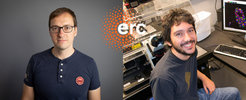Highly-coveted EU funding for two Max Planck researchers in Plön
The European Research Council (ERC) has awarded starting grants of up to 1.5 million euros to 408 scientists. Two of these highly-coveted grants go to the Max Planck Institute for Evolutionary Biology in Plön (MPI-EB).
The Max Planck Institute in Plön is pleased for two of its new research group leaders. Dr. Christian Hilbe and Dr. Javier Lopez Garrido have each been awarded an ERC Starting Grant, which will enable them and their future teams to pursue their excellently rated project ideas over the next five years.
"We congratulate Christian Hilbe and Javier Lopez Garrido on these funds," says Professor Diethard Tautz, Managing Director of MPI-EB. "The start-up grant from the European Research Council is awarded annually to outstanding scientists throughout Europe. Two of our new research group leaders will receive this grant this year. This can also be seen as a clear success for our institute and that the evolutionary research in Plön is quite attractive in European and on an international level", Tautz continues.

At the beginning of the year, the two scientists Hilbe and Lopez Garrido were together with another colleague appointed to the Plön Institute as new independent Max Planck research group leaders. Their respective research focus, however, is very different.
Christian Hilbe will deal with the dynamics of social behavior using evolutionary models based on mathematical models. In his EU-funded project, he specifically wants to examine the development of direct reciprocity in complex environments. Previous models of Evolutionary Game Theory, which use the concept of reciprocity, or colloquially, the "tit for tat" strategy, assume that all players are the same, and that they are constantly exposed to the same strategic interaction. With this project, the native Austrian and his future research team want to find out how people work together if they are either unequal (for example, if one person has much lower co-operation costs than another) or if their actions today affect the strategic possibilities of the future.
Javier Lopez Garrido from Spain, on the other hand, is pursuing a more practical approach in the laboratory with his future research group "Evolutionary Cell Biology". He wants to use the EU funding for the research of metabolic compounds during the development of bacteria. Developmental biology studies have traditionally focused on decoding signal transduction and the regulatory networks that govern cell differentiation. Lopez Garrido now wants to provide a first complete description of a metabolic development process. To this end, he plans to analyze the role of metabolic functions during endospore formation of a bacterium. A so-called endospore is formed as a form of persistence in response to, for example, hunger within an organism or a cell. Endospore-forming bacteria are widespread in nature.
These completely different questions complement the wide range of research at the MPI for Evolutionary Biology in Plön and thus make a significant contribution to cutting-edge research in this field in Schleswig-Holstein.
About the REC starting grant
ERC Starting Grants are awarded annually to young junior researchers of all nationalities. The prerequisites are that the applicant has two to seven years of experience since completion of the PhD and that ERC-funded research is conducted in one of the EU Member States. The funding is scheduled for up to five years.
The results of this year's competition show a greater variety of nationalities than ever before: The grant holders come from 51 different countries of origin around the world and will now continue their research career in 24 different EU countries. Out of a total of 3106 submitted projects, 408 applicants were awarded the ERC. This corresponds to a success rate of 13%.
KM
